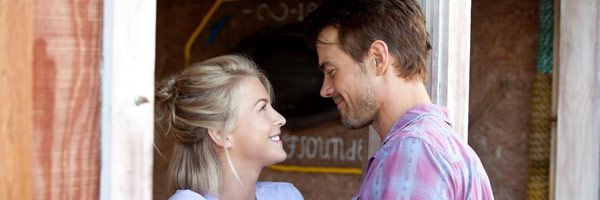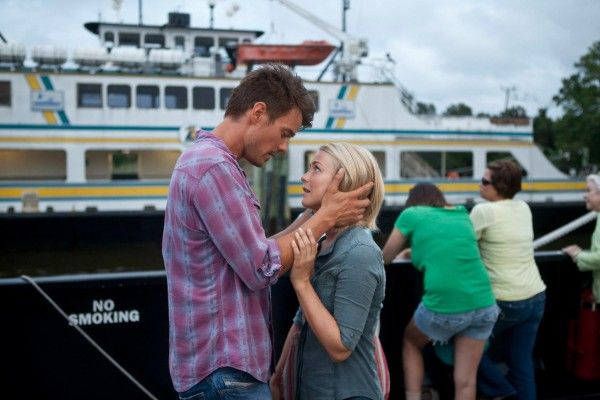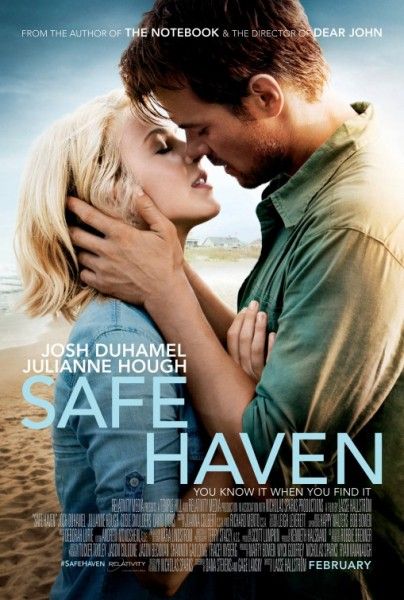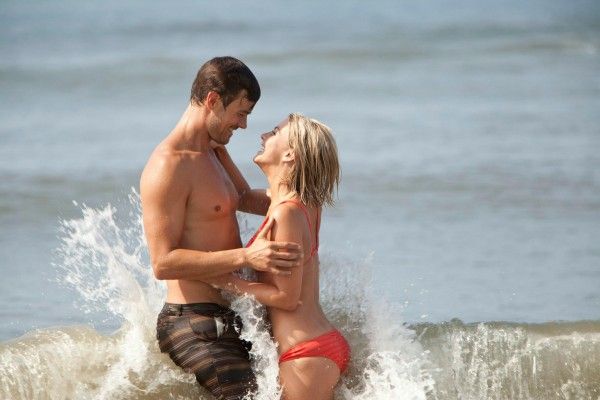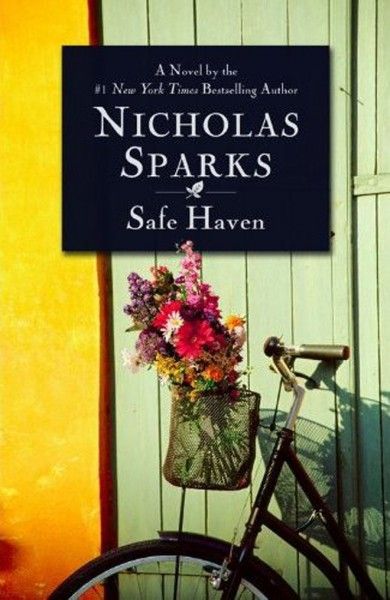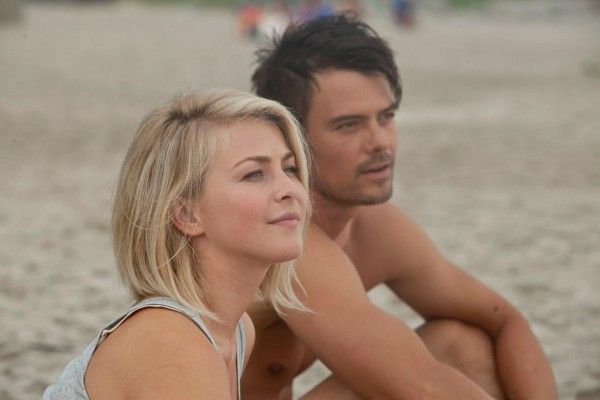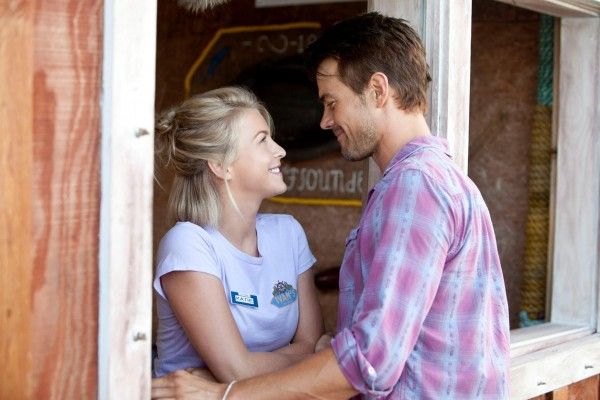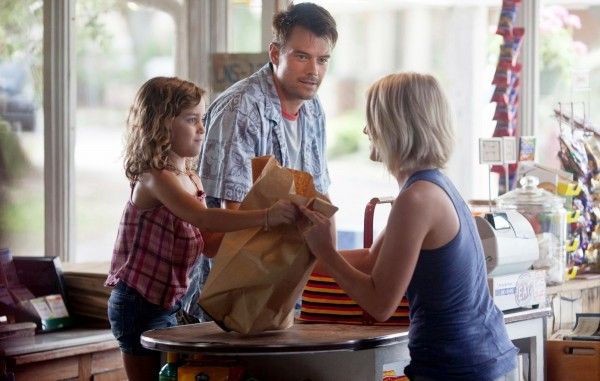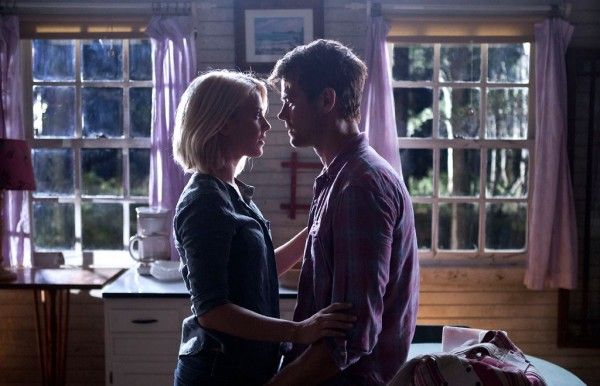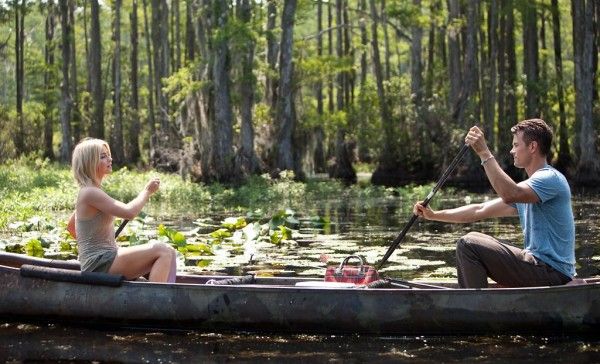Josh Duhamel and Julianne Hough get their romantic groove on for Valentine’s Day in the Nicholas Sparks adaptation, Safe Haven, which opens February 14th. The romantic thriller centers on a young woman with a dark past whose sudden arrival in a small North Carolina town raises questions. As Katie (Hough) struggles with a dark secret that still haunts her, she reluctantly finds new love with a lonely widower (Duhamel) and his two children (Noah Lomax, Mimi Kirkland). Directed by Lasse Hallström from a screenplay by Dana Stevens, the film also features Cobie Smulders and David Lyons.
At the film’s recent press day, Duhamel, Hough, Hallström, Sparks and producer Marty Bowen talked about turning the novel into a major film, what Hallström brought to the story on screen, navigating the fine line between drama and melodrama to give an authentic voice to the characters, the process of conceiving a story that might be made into a film, the terrifying yet liberating experience of improv-ing on set, and the luxury of shooting on location in the quaint seaside town of Southport where the story was set. Hough also discussed playing a victim of domestic abuse and doing her own stunts. Hit the jump to read more:
Question: For Nicholas Sparks, this is the second time Lasse Hallström has made one of your novels into a major film. What is it about Lasse that you find he brings to your stories on the screen?
Nicholas Sparks: Lasse is an actor’s director, and by that I mean he tends to draw out fantastic performances from the cast. That’s, of course, what all directors are supposed to do. Everyone has different ways of doing it, and some films tend to be very plot-driven. These films, however, are really character-driven. They are relationship-driven. They are emotion-driven. You need someone who has a really good way of enabling trust in the cast and crew, or the cast particularly, to allow them the confidence to stretch themselves to get the performance that you’re going to need to provide all of the emotional up and downs in the film. Lasse is a master at it, and he’s terrific, and then you add in everything else, the cinematography, and his style, which is to capture these small moments of life and to weave these threads throughout a film. But if you’re looking for just one thing, it is that he is an actor’s director.
Lasse Hallström: That’s an excellent answer.
Julianne, you’ve been doing a lot of dance films and this is your first romance thriller. Did you have to do anything different to prepare for this role?
Julianne Hough: Yes, I left the dancing and the singing outside. I was just blown away and blessed that I got this opportunity, because my whole life I’ve wanted to entertain, to sing, dance and act, and the fact that I got this opportunity to do that was huge. For me, it was going to an acting coach and getting more training. And then, also again, Lasse is such an actor’s director. I got to put my trust in him. It was definitely a lot more heartfelt and personal.
Josh and Julianne, can you talk about working with the children, Noah and Mimi, who were so wonderful?
Josh Duhamel: For me, a movie without kids on the set is like Christmas without kids. They just make it a little bit more fun. There’s no pretension there. They’re there to have fun. These two particularly were very sweet kids by nature. They didn’t have a lot of experience in the business. I had met with them before and spent some time on the beach with Mimi (Kirkland). Noah (Lomax) was in Atlanta so we didn’t get to hang out so much. For me, the relationship with them was as important as the relationship with Julianne in the movie because so much of this is about finding [themselves again]. They’ve both been through so much. My character has already had what he thought was his first love and lost that, and now anything that comes after that depends on how the kids react to that. Any decision that my character makes going forward has to be okay with them, too. That relationship was very specific. Luckily, they were fun kids to work with.
Hallström: He’s not making that up. We spent two weeks or more getting to know them.
Duhamel: They started working two weeks before I started. At first, I was like, really? What am I going to do for two weeks? But it was great because I got to soak in the local environment, and live in Southport, and think about what I wanted to do in this movie. I wrote a lot, spent as much time as I could with the kids, and by the time we started shooting, I felt like I was this dude. I wish that I always had that luxury of getting there that early and becoming part of the local environment.
Julianne, can you talk about playing a domestic violence victim, what it was like and your research for it?
Hough: It’s a big responsibility to do it right, to where if somebody has gone through that, it feels real and honest to them. I went and talked to women in shelters. I know people, friends, family, my own experiences, but at the same time, it was such a safe environment to do it in. Dave (David Lyons who plays Kevin Tierney) is one of my closest friends now. With Lasse, he can put you in a vulnerable situation but not so you feel exposed, so it was interesting and hard, but it also was comforting.
Josh and Julianne, Lasse had you doing improv on set. Was that a little new for both of you and is there a particular scene that you remember that you were particularly proud of?
Duhamel: There’s a lot of stuff that Lasse and I talked about before. Some of the stuff was like the whole door runner, because I loved My Life as a Dog, and I talked to him about trying to find something, a little thread of normal human behavior that doesn’t necessarily have to mean much but is something people relate to. We talked a lot about that and just kept going, and then he kept the little thing with my jeep where the door wouldn’t open, so it kept going. And then, it really paid off at the end when David’s character, Tierney, couldn’t get through that door. So, it came full circle. All the stuff on the beach, he just let us go. It wasn’t that we didn’t follow the script. We knew what we had to say in the script, and from there, he trusted us to let it go and find what the scene was really about, whatever scene it was. For me, it was the most liberating time I’ve ever had shooting a movie. It was terrifying in the beginning, because like I said, I had two weeks before. Julianne came back after the first day and said, “You know what? We improv-ed. It was great.” I said, “What do you mean you improv-ed?” Normally, I know my lines and I go and I say them, so it was scary, but he trusted us more so than anybody I’ve worked with and that was really empowering.
Julianne, did you have the same feeling?
Hough: Oh absolutely. It keeps you on the tip of your toes making sure that you’re listening and you’re being as real as possible, especially with the kids. Lasse used to say? “Oh, don’t even look. Just say whatever you want to say.” Especially the scene when I first meet Lexi (Mimi Kirkland’s character), it started out very on script and then it moved on. You would do 10-minute scenes and then find the best of what was there. It was really fun, because with kids, you don’t know what they’re going to say anyway in real life, so you just have to go along with it. It was scary at first, but I’ve never felt so trusted in anything that I’ve done, so thank you, Lasse.
Julianne, what does a guy have to do to get your attention and keep it?
Hough: Oh wow! There’s a list.
Sparks: It helps to be an author. (laughs) I’m kidding.
Hough: Honestly, [allowing me] the freedom to be me. Anybody who I want to keep their attention or they want to keep mine has to be able to let me be myself and support me and vice versa.
Lasse, when you’re directing from source material like a Nicholas Sparks novel, how do you strike the right tone and draw a line between sentiment and sentimentality so that you allow your actors to be vulnerable without their work lapsing into cliché?
Hallström: I’m drawn to any material that keeps attention to character, any story that’s driven by character. In a love story, to be there and to try to observe two people falling in love, it demands authenticity and reality. If you set out to tell the story realistically, you have to be awfully real with those performances, and there’s no other way of doing it than playing around with the material and improvising and involving everybody on all levels to make it real and charming. To make a movie charming, you have to be playful on all levels and open to ideas, and you have to have an idea for how to do that within the confines of the shooting schedule and editing and all that. It was a wonderful adventure. I love performances. I love actors. That’s my first interest in life. I’m a frustrated actor myself. I’d love to act, too. I have a theory that sentimentality is something that happens if you’re not honest and real. If you’re striving for strong emotion and strong sentiment, and you’re authentic with it and honest with it, then you’re on the right side of the line. But if you step into sentimentality, there is a false move or a false tone to it. Anything false is dangerous with this kind of material.
Marty Bowen: It’s funny because I think so often in a love story that people want to focus on the romance. What’s so fun about working with Lasse is that he’s very aware of the awkwardness and the humor involved with those moments. When you play into that, it always feels real to the audience. I also think it’s very important that when you’re on a set, especially if you’re improvising, there’s a tone that has to be set. There has to be a tone where everybody -- from craft services to your grips to your electricians to your actors -- comes in and understands the environment that they’re going to be playing in. It really is up to your director to set that tone. If you want to spend 30 minutes looking at all the video footage that we put together filming Lasse in his element doing what he does best, you’ll understand why we all had such fun in Southport.
Nicholas, how do you navigate that fine line between drama and melodrama? Also, as an author who’s had eight books now adapted to the screen, when you sit down to write, do you already have a movie in mind and do you cast your characters?
Sparks: I’ll start with the second part of that question first. The process of conceiving a story, because of my history with Hollywood, really breaks down into two parts. You have the conception of the story, which I do keep in mind that there’s a possibility that it could be made into a film. So, I try to come up with or conceive of a story that is original and yet will have some threads of familiarity with my past work but still feel utterly fresh and original. For instance, I think you can watch The Notebook and watch Safe Haven and they’re very different films and they have some threads of familiarity, but they’re very different and you can enjoy them both for the same and different reasons, and that’s what you set out to do. That’s the conception process. It’s got to pass this. It’ll be a good original film and a body of my own work and out with everyone else’s work. Then, you get to the writing, and it’s all about the novel from that point on, because there’s no guaranty it will be made into a film. And that line between sentiment and sentimentality, it’s basically Lasse’s version, but in the written word you have to strive for honesty and a character’s voice that surprises you, that doesn’t verge into [cliché]. You want to write in such a way that the reader feels the emotion before the emotion is expressed by either character. So, if someone is getting afraid, well the reader had better have been afraid a couple of pages before. It’s almost like when they finally fall in love, you’re like, “Well, yeah! I knew that. I knew that five pages ago. What took you so long to get the words out?” That’s essentially what you’re trying to do.
Julianne, the movie is partly about Katie taking back her power as well as falling in love. What characteristics do you share with her?
Hough: I think both Katie and I are fighters. People say it’s easy to walk away, but it’s sometimes not. It’s sometimes harder to walk away in situations. With this, it was her own journey of setting herself free. Obviously, she had the love of Alex and the security there now knowing that there are two people in this together. I liked the fact that Katie was the one who ended the situation between her and Kevin because she didn’t need saving from him. She did it on her own and she became that strong fighter. Having Alex there just gave her more strength.
What did you learn from playing Katie?
Hough: The same thing -- that you have to be able to be on your own and be secure with who you are and confident in who you are to move forward. It always helps having great friends and family around, but at the end of the day, it has to come from you.
Josh and Julianne, in the film, Alex tells Katie she’s safe with him. In real life, where do you feel the most comfortable and safe?
Duhamel: For me, it’s easy. It’s home. It’s going back where I’m from in North Dakota and seeing my three sisters. One’s in college now, but everybody lives there still, so it’s always nice to go back there. Now, for instance, when we’re traveling a lot promoting the movie, it’s great to get back home and decompress.
Hough: Mine’s my dogs. I like having my dogs. They’re like the mascot of every film that I do because they’re always there at the end of a long, maybe emotionally exciting day. They’re always there to love me and for me to love them and to get a shower by Lexi who kisses my face off. They’re like my safe place and home. They’re Cavalier King Charles Spaniels. Lasse and I had that in common.
How many?
Hough: Two.
Hallström: Same color, same everything.
Duhamel: (to Lasse) You have two of those also?
Hallström: We had. One is in London and the other one passed away.
Nicholas, have you heard that The Notebook is probably among the top five most romantic movies ever made?
Sparks: I have heard this.
Duhamel: He’s the one who said it. (laughs) That quote is directly from him.
Where do you go to get that kind of emotion?
Sparks: You go to character and you go to character voice. I think if you ask Marty and Wyck also that if they’re looking at a script, what they’re looking for are characters that catch your attention within the first 15 pages of a script. It’s the same exact thing in a novel. When you sit down to write Safe Haven, you want Katie to be interesting. You want to be drawn into her in the novel, and we tried to do that and I think we succeeded very well in the film. It’s who is this person? What is going on with her? I don’t know, but I‘ve got to keep watching. And then, here comes Josh playing Alex and it’s the same kind of thing. You focus in on the characters, give them voices that are original, but people that you also feel like you know and you like them. It’s like okay, I want to hear more of what this person says. Then, of course, you counterbalance that with a character that maybe you don’t like so much and you don’t want to get to know any better. And so, that’s how it starts.
Josh and Julianne, once you signed onto the project and you knew it was based on a Nicholas Sparks novel, did you feel any pressure?
Duhamel: Yes, pressure. You’re right. There is a lot of pressure to live up to the success of some of these previous movies, but we tried not to think about that. We just wanted this to be the story that it was. If I tried to do what Ryan Gosling did in The Notebook, I’d be pulling my hair out. I mean, those two were great in that movie. They really were. If we tried to replicate that in any way, it’d be a trap, and so we tried to just focus on what this story was between us, what my relationship with these kids was, and not try to force all of the romantic big movie moments. With Lasse’s help, we tried to play the simple story and trust that it was going to be interesting, emotional, romantic, and funny, and all these things that I like to see in a movie. At the end of the day, it was its own entity apart from all of the other stories in my mind.
Hough: I second that completely. I am the demographic of Nicholas Sparks’ books. I loved The Notebook, but again, this was our version of what this story is and having Lasse to bring us down. There is pressure to have these big movie moments. At some point, it was like, oh, this should be more dramatic, and it wasn’t, and it didn’t need to be, and giving the audience the credit that they deserve. They are intelligent and know what a real love story is without having to overdo it.
Sparks: I also wanted to add, that as great as Josh and Julianne were and as great as Lasse was, that also comes from the producers. I think Marty and Wyck had a very clear idea of what they wanted. It’s why they decided to work with Lasse. It’s why these two were cast. You’re looking to make a film that has a real patient, beautiful love story at its core and then you mingle that with so much else. But, that all flows also from Wyck and from Marty as well. One of the great things about this film was that everybody was on exactly the same page throughout the entire process. We all knew what we wanted to accomplish by the end, and as Josh said, we didn’t want to redo The Notebook. We wanted to do Safe Haven. And, we wanted to do Safe Haven as well as we possibly could.
Josh and Julianne, can you talk about shooting in Southport where this story takes place? How did that inform your performances? And Julianne, maybe you can talk a little bit about that cabin you had in the woods?
Hough: I thought I was going to be all Method and stay in it one night. And then, I was like, wow, it’s tick infested and I don’t want to get Lyme disease. But no, it was amazing. It’s not every day that you get to shoot in the location where the story is set. It’s gorgeous. I love Southport. It’s kind of a hidden gem. I think that if I would go there on vacation, it would be just as wonderful. The fact that we got to hang out with some of the local residents there, the restaurants were amazing, the vibe, going to the beach on weekends when you had a day off, everything about it was amazing. It was honestly one of the best summers of my life thus far because it was so calm. It’s like something about the South in general, you have more time in the day, and you get to enjoy each moment and not rush to the next.
Duhamel: I concur. I had so much fun there. Like I said before, I had two weeks before we started shooting and I really became a local. I bought my cabana from Walmart. I had my cooler. I had my boogie board. I had my book and I just hung out on the beaches. I don’t know if you’ve ever been to North Carolina, but the beaches there are incredible. It’s one of those places. It’s a sleepy little town. It’s very quaint and charming and all those things that you think of when you read about them. There are all these old colonial houses overlooking the sea and the marina. It’s just really fantastic, so we had a lot of fun and the people, not only that live there but this crew, we all became a family which is one of the things that I love about making movies. You get close with this crew and the people that you are working with for this short amount of time. In this case, in particular, it was a really special place.
Hough: And, not that you’re forced to hang out, but you kind of are because it’s so small and there’s only a certain amount of places. You would see people out and it was so fun. One of my favorite things was the ring game where you have to toss the ring onto the hook. It’s really addicting and awesome.
Bowen: Anecdotally, two days before we started shooting, my wife gave birth to twins there.
Sparks: They are Tar Heels.
Bowen: And we probably got, I want to say, six or seven casseroles. The neighbors would just walk over and bring us cookies and casseroles. It was just an ongoing thing. If you went for a walk in that town, say you got up at 6:30am before we started shooting because you wanted to get a little exercise in, by the second day, if someone had seen you a second time, they would literally be in your path and want to stop and talk and get to know you. You would see those people. It’s a town of maybe 3,000 people.
Duhamel: (joking) They wanted a part in the movie, Marty.
Bowen: No. You found so often that they were just the loveliest people you could possibly imagine. We all got our coffee at this place called the Moore Street Market that we ended up putting in the movie, and it would take about ten minutes to get a cup of coffee. That’s only because everybody would come there in the morning and stop and talk and sweat. It became part of your process and you were willing to wait for that caffeine fix because you were having such a good time with all these people.
Josh, could you imagine yourself living in a small town where everybody knows everybody and where you could be part of a community, or are you more of a big city guy?
Duhamel: I grew up in a state full of little towns like that. Where I’m from is a little bit bigger, but North Dakota is sort of similar minus the beach and all the beauty. It does have its own beauty for about two months out of the year and then it’s really cold. It’s in my blood. I grew up in a place like this, so I would be more akin to live in a place like this than I would in a big city. I love New York but that’s too much for me. That town almost swallowed me up. I lived there for three years. So, in answer to your question, I would probably prefer a smaller town, like Los Angeles. (joking) It’s a whole bunch of little villages next to each other.
The chemistry between you and Julianne felt very authentic. How were you able to create that?
Duhamel: For me, the first time I was in the room it was me, Marty, and Lasse. There was something about Julianne that came [across]. There’s something really relatable about her and what you see is what you get. I knew that it wouldn’t be difficult to get through to her and for her to get through to me. There’s something really honest about her. Lasse calls her ‘honest blue.’ I think that’s a really good description of Julianne. I probably had very little say in who they cast, but I was really happy when they made that decision because I knew that it would be an easy sort of thing to make feel real. And yes, there are moments like the stuff on the barge at the end of the movie where you do that over and over. It feels great the first couple of times and then it’s like, “Oh God, we’re going to do it again. Okay, remember, I’m coming to get you before you leave. We have to make sure this feels real.” In any movie-making situation, you’re doing something a lot of times. For the most part, it just felt easy with Julianne.
Hough: I remember my audition for the movie. The first time I went in, Lasse was still in Bedford, Connecticut so he was on Skype. I remember going in and doing the best that I thought I could do, but when I left, I was like, oh man, I wish that he could have been in that room so he could have felt what we were feeling. I worked my booty off. I called and I was like, “You’d better let me audition again. Please let him be in the room.” I wanted it so bad. Like I said before, this was the greatest opportunity for me to grow and expand. When we went in the second time for the audition, I got my wish. It was even better. And so, the more you hang out with and get to know somebody, the chemistry obviously either works or it doesn’t, and it just kept working the more that we hung out together on set and whatever. He’s not bad to look at either.
Duhamel: Thank you. By the way, the stuff with her and Dave, even though he was an abusive husband, I was like, “Wow. Those two are really good together.”
Hough: My first day of shooting was with Dave and when all that went down in the house. So it was like, “Hey, how are you?” Kapow! We got to be close very quickly and we became really good friends, too.
Did you use a stunt woman?
Hough: No. We had a stunt woman, but these guys will tell you, there’s no way I was going to let them do that. That’s fun to me. It’s like dancing. It’s choreography and I love that active feeling. I did get hurt a little bit, but I didn’t tell anybody.
Safe Haven opens this weekend.

